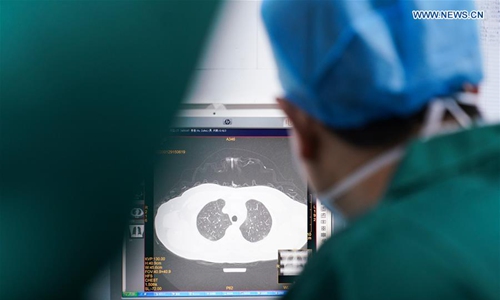HOME >> CHINA,SPECIAL-COVERAGE
Inflection point unknown amid coronavirus outbreak: WHO
By Bai Yunyi and Chen Qingqing Source:Globaltimes.cn Published: 2020/2/7 1:11:50

A doctor checks the CT image of a patient's lungs in Zhangzhou Municipal Hospital in Zhangzhou, southeast China's Fujian Province, Feb. 2, 2020. Zhangzhou Municipal Hospital is a designated hospital to treat patients infected with the novel coronavirus in the city. It has started receiving patients with its emergency wards since Jan. 26 in a bid to fight against the virus outbreak. (Photo by Xiao Heyong/Xinhua)
The World Health Organization (WHO) said it would be impossible to predict the spread of the novel coronavirus and to determine an inflection point as it is a new disease with many unknowns such as the source and transmission modes.
The highly contagious respiratory virus, which was first reported in Wuhan, Central China's Hubei Province, has seen 28,018 cases nationwide, and claimed 563 lives.
An email to the Global Times from WHO spokesperson Tarik Jašarević said, "At this stage, it is not possible to predict the spread of the virus as this is a new disease with many unknowns."
The virus source, officially known as 2019n-CoV, remains unknown, but it was caused by a zoonotic spillover event, Jašarević said, noting that events likely to have occurred that transmitted the virus from a potential animal source to humans and for the human-to-human transmissions.
Further investigation and analysis of epidemiological data are necessary to understand the extent of the transmission, Jašarević said.
On January 30, WHO officials declared the novel coronavirus outbreak was a public health emergency of international concern (PHEIC) after multiple factors were taken into consideration. The agency also emphasized they will continue to have confidence in China's ability to control the outbreak.
Following the PHEIC classification, many countries began implementing measures beyond what was recommended by WHO, including additional travel restrictions. So far, 22 nations have introduced trade or travel-related measures, which are being reviewed by WHO officials.
Evidence of travel measures that interfere with international traffic for more than 24 hours reveals a public health rationale during early outbreak containment efforts. They also allow affected countries to implement sustained response measures, and provide non-affected countries with more time to initiate and effective measures, Jašarević explained.
Such restrictions need to be short in duration, proportionate to public health risks, and be reconsidered regularly as the situation evolves, he added.
Jašarević also explained that WHO officials are handling the new virus and how it understands it is rapidly changing. Health officials will also continue to analyze information from existing and new cases, which is critical to enhancing awareness.
Posted in: SOCIETY